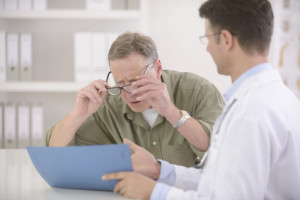 Nurses work with people in crisis. Their coping abilities are dependent upon many factors. Nurses sometimes recognize that patients are in denial, but sometimes patients are in denial and do not let nurses know it.
Nurses work with people in crisis. Their coping abilities are dependent upon many factors. Nurses sometimes recognize that patients are in denial, but sometimes patients are in denial and do not let nurses know it.
Facing a new diagnosis is overwhelming. Some people may have been going about their everyday business one day and then diagnosed as a patient with a life threatening illness literally overnight. The defense mechanism denial may be in place even if a patient is cooperative and following treatment recommendations calmly.
Denial is a very powerful protector. A person may logically comprehend “bad news” yet their psyche rejects it so strongly that they involuntarily resort to magical thinking.
An example of denial which made this clear to me was an experience in my own life. Many years ago, I had cancer. As a nurse, I knew that the prescribed chemotherapy had a100% chance of causing hair loss. I knew this fact and could calmly state it, as I had a mastectomy and prepared for the chemotherapy.
My “nurse brain” absolutely knew that my hair would fall out. Yet, I honestly thought that it would not. I thought, “That hair loss happens to others, but not me. Maybe I will lose a couple of strands but that will be all. “I was not emotional in my belief nor was I particularly attached to my hair.
I simply believed that for me, hair loss simply would not happen. It just felt like a true fact. Obviously, I was wrong. My hair did fall out. It was not particularly stressful, I just accepted it. Until the hair loss actually happened, I do not think that anyone could have convinced me differently. I did not disagree with any teaching provide to me. I just agreed when being taught, even though I did not think, it applied to me.
As a result of my own experience, I learned some valuable information that I have put into my nursing practice.
Do not assume that if a patient voices comprehension, that the teaching really has “sunk in.” I think an important lesson that I gleaned is that it would have been detrimental to me if someone had insisted that I accept the “facts “about the side effects of the chemotherapy. It would have been frustrating for both patient and nurse.
Another thing that I learned from this experience is not to judge. I believe that if I had voiced my irrational thought to my caregivers that they would have been alarmed and reached the conclusion that I was not coping well with the cancer diagnosis at my young age.
In fact, I coped very well with the emotional impact and was very matter of fact about my mastectomy and chemotherapy even though I became very ill physically. At that time and in the many years since, I simply believed that “I have this cancer” I need to treat it and then I will be well. I did treat it and I am well.
The other very important lesson that I learned is that that as nurses, we learn that denial is a defense mechanism. The key term is defense. That is exactly what denial is.
In my case, denial helped me to deal with treatment and my diagnosis.
Sometimes I think that we nurses feel that we must” break through a patient’s denial”.
If denial is hindering treatment, then perhaps it should be addressed. If so it should be addressed calmly and factually, allowing the patient time to process the teaching. In many cases, it will resolve itself without further intervention. When nurses “push “too hard, other emotions, such as resistance, anger or”non compliance” may result.
Denial is not necessarily a “problem” but a natural coping skill which the body, in its innate wisdom provides. It needs to be respected and honored for its role in the healing process.


No comments yet.